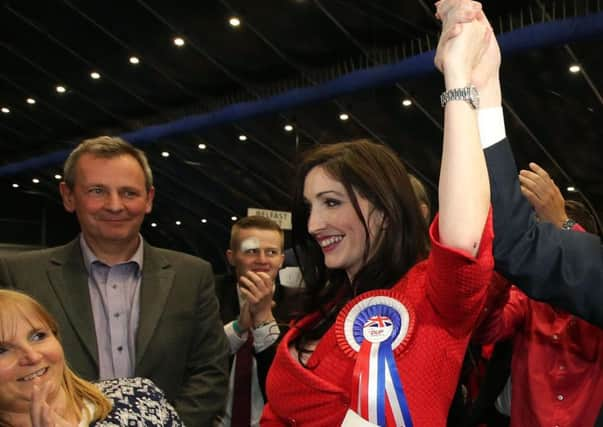Top health official warned staff over political tweets before taking advice


Just days before March’s Assembly election, the News Letter obtained a leaked copy of an email which Richard Pengelly, permanent secretary of the Department of Health, sent to the chief executives of Northern Ireland’s five heath trusts in which he said he was “increasingly concerned” at the number of “overtly political” tweets from health staff.
The two tweets he said were inappropriate were critical of the DUP and Sinn Fein and had been sent from two doctors’ personal accounts.
Advertisement
Hide AdAdvertisement
Hide AdMr Pengelly – whose wife, Emma Little-Pengelly, was a DUP MLA but lost her seat in the election – said that “whilst clinically independent, front line colleagues must remember that they are employees of the service, and thus such public statements are not appropriate”.
Mr Pengelly – who since the collapse of devolution has been the single most senior figure over the health service in the absence of a democratic minister – then cited two tweets from doctors containing criticism of the DUP and Sinn Fein.
One of the tweets cited said that if people spoilt their ballots next week then the DUP and Sinn Fein would “get to feck it all up again”.
Many medical staff reacted furiously to the advice.
The News Letter submitted a Freedom of Information request to the department asking for all material relating to the email, including advice about its contents.
Advertisement
Hide AdAdvertisement
Hide AdThe department said it was releasing the entirety of what it held on the matter but no advice prior to the email is revealed.
Instead, the documents appear to show that Mr Pengelly only began asking for advice on the legal position after the News Letter and others questioned his actions.
On February 28 – the day after the email was made public – a senior official wrote to Mr Pengelly and others, referring to an earlier discussion, and included a copy of election guidance for civil servants.
The email added that for health staff “I would suggest this is a matter for an individual and their employer”.
Advertisement
Hide AdAdvertisement
Hide AdAnother of the documents shows that someone within the department – whose name has been blacked out – suggested that Mr Pengelly should say that he stood over the comments.
The suggestion was made in response to a question from the News Letter at the time.
The official asked Mr Pengelly if he was happy to issue the questions in a way outlined in the email. In response to the question of whether Mr Pengelly stood over his comments, the suggested response was “Yes”.
Then, when asked if his instruction applied to every health trust employee, from cleaners to consultants, the suggested response was “yes, HSC employees”. However, those responses were never issued.
Advertisement
Hide AdAdvertisement
Hide AdInstead, the News Letter was ultimately given the same line that had been issued the previous day, which did not address the questions but said that staff “have the right to express their own personal opinions on social media. However this should be in line with the HSC Code of Conduct”.
When asked yesterday why Mr Pengelly issued a sweeping instruction without first clarifying the law, the department said: “The permanent secretary did not issue a ‘sweeping instruction’ nor any other form of instruction to staff. His email to chief executives simply asked that they ‘re-enforce the need for common sense’ when using Twitter.”
Yesterday it emerged that the British Medical Association (BMA) has obtained legal advice questioning what Mr Pengelly did.
In a letter to BMA members, the body’s Northern Ireland chairman John Woods said that many doctors had been “concerned at what they saw as an inappropriate attempt to extend valid restrictions on what they can say in public while in their working roles, into their non-professional, private lives”.
Advertisement
Hide AdAdvertisement
Hide AdHe went on: “In order to clarify your position the BMA instructed John Hendy QC of Old Square Chambers London, a recognised legal expert in employment law, to provide a detailed opinion.
“This legal advice states that doctors using social media must follow their employer’s employment policies and procedures where these are contractual and lawful ... However, the QC’s opinion is that it would be unlawful for Mr Pengelly or the chief executives of HSC trusts to seek to prevent clinical staff from, or to punish clinical staff for, expressing their political views on Twitter or any other form of social media in their time away from their work, so long as such ‘tweets’ do not transgress any contractual restrictions.”
The BMA said that it wrote to Mr Pengelly a fortnight ago about the issue but received no response so again wrote to him last week.